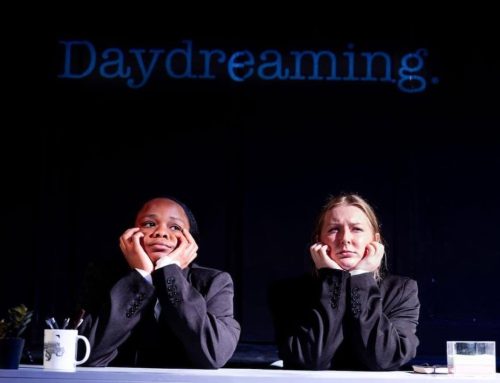“My name is Dylan Ward and I have autism” writer and performer Joe Dennis tells us shortly after the beginning of his semi-autobiographical one-man show Tides. He spends the preceding couple of minutes unpacking a shoebox full of children’s Marvel figurines, placing them at the front of the stage in exact and precise height order. It is the kind of behaviour one might associate with being on the spectrum. But it is also an indication of intent. Dennis’ deeply personal piece is about unpacking and laying out, with clarity and precision, one individual’s experience of growing up and living with autism. It may or may not reflect the varied experiences of the other 700,000 adults and children in the UK with the disability, but it packs a punch, nonetheless.
Growing up, Dylan is petrified of sensory overload and tough to be around. Noises, smells, and bright lights drive him to distraction. He feels emotions such as grief, anger, and joy with ferocious strength and his inability to find words to describe how he feels leads him to smash things up instead of speaking out. No wonder a flustered high school teacher (with a remarkable resemblance to Star Wars’ Darth Vader) wonders, “what planet are you on?” Later at college he misunderstands banter, labelling exasperated fellow students as “bitches” by way of misdirected casual camaraderie. At work his attempts at what he sees as kindness lead to a cascade of complaints to his manager over inappropriate language.
But Dylan is also capable of great feats of creativity and compassion. “Imagination is your superpower” one primary teacher says. His ability to conjure up complex fictional universes win him a first class degree in creative writing. The man is annoying as hell. He gets why people find him aggressive, even when he is trying to be nice. Is the problem really with him or does it lie with the culture that just does not understand or respect neurodivergence?
Delivered by way of monologue and pre-recorded audio clips of unseen teachers, parents, medics, and co-workers, Tides occasionally threatens to spill over into self-pity. One suspects Dylan has a slightly rose-tinted view of the lives that “muggles” (his nickname for people who do not have autism) lead. One does not necessarily need to be on the spectrum to face challenges with sadistic teachers, insensitive fellow students, or undermining bosses. But Will Sutherland’s direction, packed with humour and momentum, and Dennis’ enormously engaging stage presence, make up for an occasional slide into slushiness.
Writer: Joe Dennis
Director: Will Sutherland
More Recent Reviews
Milked. White Bear Theatre.
Written in 2013 and first seen a decade ago in a production at the Soho Theatre, Simon Longman’s slice [...]
Fresh Mountain Air. Drayton Arms Theatre.
Lana Del Rey’s ode to female unity and resilience, God Bless America And All the Beautiful Women In It, [...]
Rodney Black: Who Cares? It’s Working. Lion and Unicorn Theatre.
Rodney Black is a tacky small-time comedian with a venal manager and a taste for nasty misogynism. “I’m a [...]






